The Faculty Mentoring Program offers support to all full-time faculty. It builds upon the expertise and scholarship of faculty from all ranks and disciplines. The scope of the program contributes to a collegial, and collaborative culture while supplementing the traditional one-on-one mentoring assignments made through IU Columbus’s academic divisions.
Through our “mentor bureau,” mentors offer guidance in their areas of expertise. Mentees have the opportunity to work with multiple mentors to augment their skills in teaching, research, and service. For example, mentees and their mentors have worked on instructional techniques, online teaching, preparing promotion and tenure dossiers, interdisciplinary research projects, community outreach efforts, and designing study abroad experiences.
Peer mentoring is an equally essential element of the program. Mentees meet regularly over lunch to provide each other with social support and expand their repertoires of professional success strategies. The program includes an annual retreat and provides professional development opportunities related to mentoring (see below).
Last but not least, we get together to carry on our program traditions: awarding participants with their “Owls of Wisdom” and making our semi-annual pilgrimage to the local bowling alley.
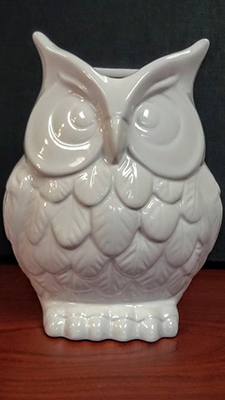
Owl of Wisdom
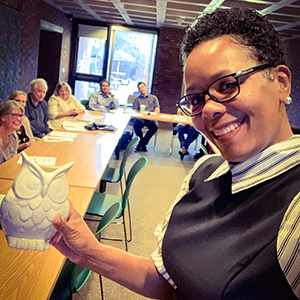
Etta Ward, IU Indianapolis Assistant Vice Chancellor for Research, keynote speaker at the 2019-20 program retreat, Oct. 4, 2019, Bartholomew County Public Library. Seated L-R, Andrea Valentine, Julie Goodspeed-Chadwick, Terry Dibble, Kate Wills, Mohammed Noor-A-Alam, Brian Russ.
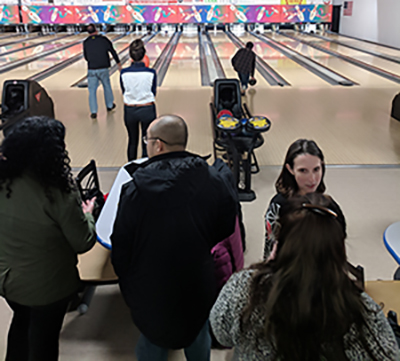
Bowling happy hour at Columbus Bowl, December 6, 2018. L-R: Lori Montalbano, Aimee Zoeller (bowling), Kimdy Le, Lisa Siefker Bailey, Liz daSilva (facing camera).
Program background
The Faculty Mentoring Program began in 2015-16 as a pilot program titled “Career Self-Efficacy Mentoring for Pre-Promotion Under-Represented Faculty at IUPUC,” that was funded by the IUPUI Mentoring Academy. The pilot program’s emphases on providing mentoring on career self-efficacy for those under-represented among the faculty including women, minorities, and first-generation college graduates were based on a mentoring needs assessment conducted in 2014-15. The pilot program matched ten mentees with trained mentors who helped them develop strategies for career-self-efficacy.
Based on participant feedback, the pilot program was expanded in 2016-17 to offer mentoring to all full-time Columbus faculty and to replace traditional dyadic mentoring with the mentor bureau and peer-mentoring. In 2019, the program received sustaining support through an IUPUI Mentoring Academy Recharge Grant. In 2020, the program became institutionalized within faculty governance with the establishment of the Faculty Mentoring Program Advisory Board under the aegis of the IU Columbus Faculty Senate. As of 2021, 57 faculty members have participated in the program as mentees, mentors, and/or program committee members. For additional background, please go to Program Publications (see Program publications list below).
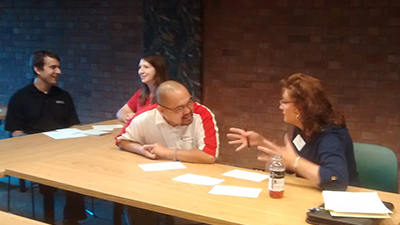
L-R: J.D. Mendez, Joan Poulsen, Kimdy Le and Angela Opsahl at the pilot program retreat, Sept. 1, 2015, Bartholomew County Public Library
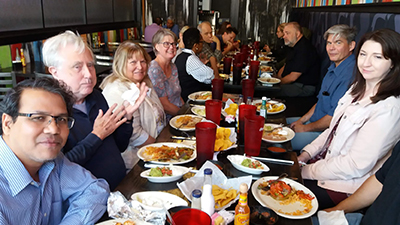
Lunch at Luciana’s Restaurant, Columbus, Oct. 4, 2019. Facing right, front to back: Mohammed Noor-A-Alam, Terry Dibble, Kate Wills, Andrea Valentine, Etta Ward, Julie Goodspeed-Chadwick, Scott Desmond, Brian Russ, Lisa Seifker Bailey. Facing left, front to back: Joan Poulsen, Larry Ruich, Jon Padfield, Stephanie Serriere.
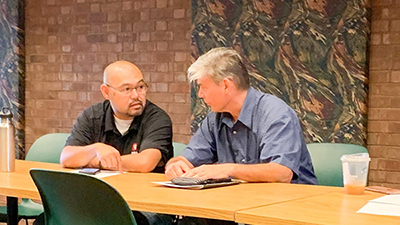
Kimdy Le & Larry Ruich at the 2019-20 program retreat, Oct. 4, 2019, Bartholomew County Public Library
For more information
Please email George Towers or another member of the Faculty Mentoring Program Advisory Board:
- Elizabeth daSilva
- Rebekah Knauer
- Kimdy Le
- Joan Poulsen
- Larry Ruich
- George Towers
- Aimee Zoeller








